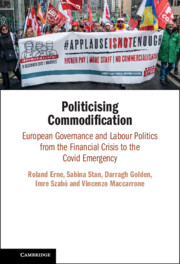Analytical Terms
- Federal:
(from Latin foedus ‘alliance’) Organisational principle in which individual members (constituent member states) have a degree of autonomy and statehood but are united to form an overarching totality
- Horizontal vs. vertical European integration:
Typology that distinguishes market-driven horizontal and political vertical modes of European integration
- Intergovernmental:
(from Latin inter ‘between’) Intergovernmental relations are relations between governments
- International:
(from Latin inter ‘between’) International relations are relations between nation states
- Politicising [something]:
An activity that makes an issue become ‘political’ in character (see Erne, Reference Erne, Nanopoulos and Vergis2019)
- Supranational:
(from Latin supra ‘above’) Supranational law supersedes national law
- Transnational:
(from Latin trans ‘across’) Refers to social processes that transcend national boundaries and national systems
European Institutions
- Council (of the European Union):
Co-legislator and co-executive of the EU, uniting the responsible national ministers (or governments’ permanent representatives in Brussels)
- Council of Europe (CoE):
International organisation based in Strasbourg, created in 1949 to uphold human rights and democracy in Europe; not an EU institution
- Directorates General (DG) (of the Commission):
Government departments of the Commission in charge of various policy areas, e.g., economic and financial affairs (DG ECFIN), employment, social affairs, and inclusion (DG EMPL), health (DG SANTE), etc.
- EU executives:
The European Commission and Council
- EU legislators:
The European Parliament and Council
- EU social partners:
The representative organisations of management and labour that can act as co-legislators in the social policy field (Art. 154 and 155 TFEU)
- European Commission:
Principal executive arm of the EU composed of its President and its College of Commissioners and the EU’s civil service
- European Council:
Institution uniting the heads of states and governments; it is not involved in everyday EU governance but defines its general direction, namely, in crisis situations
- European Parliament:
Directly elected co-legislator of the EU; no decision-making role in the EU’s new economic governance (NEG) regime
Legal Instruments of the EU
- Decisions:
Binding legal acts of EU institutions, e.g., on the allocation of EU funding
- Directives:
EU framework laws that must be transposed into national law to take effect
- EU Treaties:
Primary EU legislation, including Treaty on European Union (TEU) and Treaty on the Functioning of the European Union (TFEU)
- Recommendations:
Formally non-binding legal acts of EU institutions, which may still have significant coercive power in conjunction with other EU laws, such as the Six-Pack
- Regulations:
EU laws that do not need to be transposed into national laws to take effect
Tools of the EU’s New Economic Governance (NEG) Regime
- Council Recommendations (on National Reform Programmes):
containing a set number of country-specific recommendations (CSRs); legal act outlining the NEG prescriptions that the Commission proposes in spring and the Council adopts in July every year
- Europe 2020:
Non-binding EU policy coordination and growth strategy adopted in 2010
- European Semester:
Yearly cycle of country-specific NEG prescriptions, surveillance, and enforcement, integrating MoU-, SGP-, MIP-, and Europe 2020-related NEG prescriptions in one document
- European Stability Mechanism (ESM):
Financial bailout mechanisms created in 2011 for EU member states in the eurozone
- Macroeconomic Imbalance Procedure (MIP):
Constraining EU economic governance tool institutionalised by the EU’s Six-Pack laws of 2011
- Memoranda of Understanding (MoUs):
Very constraining EU economic governance tool outlining the policy conditionalities for the receipt of EU bailout funding
- NEG prescription:
Shortest segment of an MoU or a CSR outlining a specific policy instruction issued by EU executives’ within the EU’s NEG regime
- Six-Pack (of EU laws on economic governance):
Package of six EU laws that institutionalised the EU’s NEG regime in 2011
- Stability and Growth Pact (SGP):
Constraining EU fiscal and economic governance tool created in 1997 and reinforced by the Six-Pack laws of 2011; EU executives temporarily suspended its application after the outbreak of the Covid-19 pandemic in March 2020
Tools of EU’s Post-Covid New Economic Governance (NEG) Regime
- National Recovery and Resilience Plan (NRRP):
National government document used for applying for EU RRF funding; key document of the post-Covid NEG regime
- Recovery and Resilience Facility (RRF) Regulation:
EU law that in 2021 institutionalised the EU’s post-Covid NEG regime and the conditionalities for the receipt of RRF funding
- Council Implementing Decision (CID):
Legal act endorsing the Commission’s assessment of NRRPs and specifying the policy conditionalities for receipt of RRF funding
EU Employment Relations and Social Policy
See the European Industrial Relations Dictionary of Eurofound, the EU’s tripartite foundation for the improvement of Living and Working Conditions, https://www.eurofound.europa.eu/en/european-industrial-relations-dictionary

